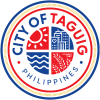Ususan
Ususan | |
|---|---|
Barangay hall | |
| Coordinates: 14°32′3.588″N 121°4′3.4284″E / 14.53433000°N 121.067619000°E | |
| Country | Philippines |
| Region | National Capital Region |
| City | Taguig |
| District | Part of the 1st district of Taguig |
| Government | |
| • Type | Barangay |
| • Punong Barangay | Marilyn Marcelino |
| • Barangay Councilor |
|
| • Sangguniang Kabataan Chairperson | Mary Avigail Felipe |
| Population (2020) | |
| • Total | 53,956[1] |
| Time zone | UTC+8 (PST) |
| Postal Code | 1639 |
| Area code | 02 |
| Website | barangay-ususan |
Ususan is one of the 38 barangays of Taguig, Metro Manila, Philippines.
Etymology
[edit]Ususan is Tagalog as the barangay is shaped like the letter “U” formed by the Taguig River. Historically, wood from the forest of Ususan and areas now part of Fort Bonifacio were transported along the riverbanks, earning it the moniker "Us-usan ng Kahoy" or "slide."
The old name of Ususan was Maysapang.[2]
History
[edit]Ususan is one of the original villages or barrios of Taguig when it was established as a pueblo (town) under the Provincia de Tondo in 1587.[3] During the Spanish government reign in Taguig, men from this barrio were forced to be part of the Polo y Servico.
Also under the jurisdiction of Barangay Ususan were the National Battle Monuments Cemetery,[4] also known as the Manila American Cemetery. Half of the Garden of Memories Memorial Park is also within the territory of the barangay.
Ususan is made up of four areas, namely: Subaan, Ibaba or Lungos, Kabilang Banda (Ibayo) and Pampangin.
As a barangay of Taguig, Ususan also claimed the northern part of Fort Andres Bonifacio, which particularly consists of the Bonifacio Global City and Manila American Cemetery,[5] until these were ceded to Barangay Fort Bonifacio, which was created in 2008.[6]
Geography
[edit]Ususan is bounded on the north by Rizal, northeast by Martires Del '96 and San Roque in Pateros, on the east by Palingon Tipas, to the southeast by Calzada Tipas and Tuktukan, to the south by Bambang, and on the west by Pinagsama through the Circumferential Road 5.
The exclaves of LogCom is bounded by Pembo on the northeast and Circumferential Road 5 on the southwest. These exclaves once overlapped the former Makati barangays of Post Proper Southside, Pembo, and Rizal.
References
[edit]- ^ "2020 Census of Population and Housing (2020 CPH) Population Counts Declared Official by the President | Philippine Statistics Authority". psa.gov.ph. Retrieved July 12, 2021.
- ^ A gift of faith, 400 years. Quadricentennial (1587-1987) St. Anne Parish Tagig, Metro Manila; commemorative book page 55, circa 1987.
- ^ "Taguig's Santa Ana and the "probinsyudad" feels". The Urban Roamer. February 5, 2021. Retrieved June 16, 2023.
- ^ https://lawlibrary.chanrobles.com/index.php?option=com_content&view=article&id=50148:gr-168781-2007&catid=1496&Itemid=566
- ^ G.R. No. 168781 (September 14, 2007), City of Makati vs. The Hon. Judge Briccio C. Ygaã‘a, and Municipality of Taguig, retrieved November 19, 2023
- ^ Memorandum Order No. 292, s. 2008 (December 12, 2008), Expressing Concurrence and Ratification in the Deputation of Law Enforcement Agencies and Other Concerned Agencies in Connection With the December 18, 2008 Plebiscite to Ratify the Creation of Barangay San Miguel, Barangay Tanyag, Barangay South Daang Hari, Barangay North Daang Hari, Barangay Central Bicutan, Barangay North Signal Village, Barangay Katuparan, Barangay South Signal Village, Barangay Central Signal Village, Barangay Pinagsama, Barangay Fort Bonifacio and New Lower Bicutan, All of Taguig City, Official Gazette of the Republic of the Philippines




